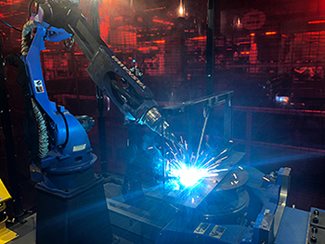 Celebrating 125 years of innovation and experience in the mass transportation seating market, leading manufacturer and supplier Freedman® Seating Company of Chicago, Illinois implements continuous improvement initiatives and advanced manufacturing technology to provide excellent products with impeccable service for on-time delivery. Founded in 1894, the company started when award-winning upholster, Hyman Freedman, began making seat cushions for horse-drawn buggies. Four generations later, Freedman Seating is still a family-owned and -operated business, producing the highest quality seating products for the mass transit market.
Celebrating 125 years of innovation and experience in the mass transportation seating market, leading manufacturer and supplier Freedman® Seating Company of Chicago, Illinois implements continuous improvement initiatives and advanced manufacturing technology to provide excellent products with impeccable service for on-time delivery. Founded in 1894, the company started when award-winning upholster, Hyman Freedman, began making seat cushions for horse-drawn buggies. Four generations later, Freedman Seating is still a family-owned and -operated business, producing the highest quality seating products for the mass transit market.
Today, the company’s 400,000+ square foot manufacturing facility and diverse 900-employee workforce serve to provide a total value-added seating package for major OEMs, bus distributers, municipal governments and more. Offering seating-related products for many different applications including bus, rail, marine, and commercial and specialty vehicle seating, Freedman Seating eliminates customer seating concerns by leveraging the skills and values present in its 85% minority and women workforce.
Responsible for manufacturing the largest selection of foldaway seating in the industry, Freedman Seating decision makers were mindful of the time spent welding steel carbon components for foldaway seat frames. While the current process of using three robots at multiple stations to fabricate parts, plus the additional use of a hand welder at times, was safe and effective, the 18- to 20-minute per part cycle time was not conducive for keeping pace with growing customer demand. Moreover, the energy spent by three human operators to set up components and transfer parts was hindering optimal workflow on the factory floor.
Dedicated to improving operations and keeping costs down, company leaders reached out to their prior robot supplier, Yaskawa America, Inc – Motoman Robotics Division (Yaskawa Motoman), for a more efficient solution. Because of the nature of the application, it was determined that a compact, flexible robotic workcell—equipped with a five-axis double-ended tilt-rotate positioner integrated with two MotoPos D500 positioners for 360° rotation—was needed to streamline the production process for the welding of foldaway seat “T” and “V” groove joints.
Solution
After a thorough process review, and a design and building phase, Freedman Seating implemented a custom robotic welding workcell for the manufacturing of foldaway seat frames.
The solution featured one Yaskawa Motoman® robot on a fabricated steel riser; a MA2010 extended-reach welding robot with through-the-arm torch cabling and equipped with a Miller Continuum™ 350 weld package. The robot also featured a ComArc seam tracking package with 200-V high-speed touch sensing function, suitable for tracking stainless steel lap joints from 3mm in thickness and higher. This function assists in compensating for weld joint location variance, helping the robot system produce precise, clean welds.
The custom tilt-rotate positioner was a combination of a standard turntable base with framework to hold two MotoPos D500 tilt-rotate positioners on each side. Each servo-driven MotoPos D500 two-axis positioner has a 500 kg payload capacity with ±0.1 mm repetitive accuracy; each can rotate ±370° and tilt ±135°, enabling the continual welding of seat joints from 1/16” to 1/8” thick in continuous motion.
To ensure perfect synchronized motion between the robot and MotoPos positioners, the use of coordinated motion software in the robot controller is used. This highly-accurate control system enables the robot and positioner axes to move in unison at an interpolated constant speed, allowing the torch to maintain optimum posture while the workpiece turns for maximum weld quality during each cycle.
Results
After a successful run off at Yaskawa Motoman headquarters (Miamisburg, Ohio), the installation of the robotic workcell for the welding of seat frames began. Within two weeks the system was up and running at minimal capacity. While prior robot programming knowledge possessed by team members was extremely helpful during the transition, two robot technicians from Freedman Seating attended Yaskawa Academy located at Yaskawa Motoman to learn how to adjust to programming the MA2010 robot and MotoPos D500 positioners in conjunction with coordinated motion.
Within ten weeks of the run off, the two Yaskawa Academy-trained Freedman Seating technicians, along with technical experts from Yaskawa Motoman’s Customer Satisfaction Group, had the system running at full capacity. Overall, transition to the new robotic workcell has been successful for the proud Chicago manufacturer, and the company is well on its way to achieving ROI within the designated payback period.
Since the workcell’s full implementation in summer of 2018, the welding of foldaway seat frames with the new robotic system has increased production efficiency. Most importantly, the workcell’s arc welding robot, robust weld package, seam tracking capabilities and tilt-rotate positioner work together to produce the high-quality welds anticipated by customers in seven minutes or less per part.
The two-station system operates two eight-hour shifts a day, five days a week to maintain steady foldaway seat production. A process that once took three robots and three human operators to accomplish, is now even more efficient, exceeding customer expectations. Managed by one operator, the robotic welding workcell with tilt-rotate positioner has freed three robots to weld other parts and has helped to redeploy two workers to other high-value operational tasks within the company.
From the planning stages through complete installation, the robotic workcell implementation process has been a microcosm of the Freedman Seating corporate culture. From manufacturing to finance, the communication, corroboration and collaboration of every department made the project a success. Most importantly, values held by the company for over a century made the system integration a “win” for Freedman Seating and its valued customers.
Full case study article originally published in Metalforming, but now showcased on Freedman Seating’s website.